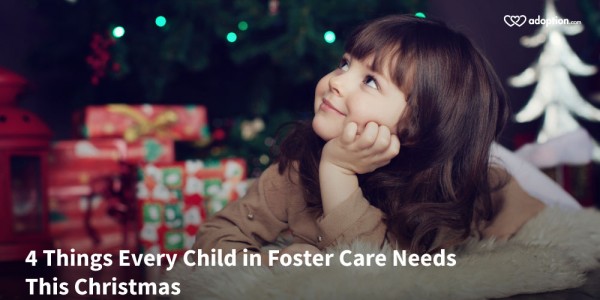Being in foster care is difficult; especially during the holiday season. Christmas can bring up a whole host of emotions in children and youth who have found themselves caught up in the child welfare system. Foster parents may experience a variety of emotions and behaviors during this time of year. Although these things are expected and understandable, there are things that foster families and others can do to help these kids still have a merry Christmas
Here are four things every child in foster care needs this Christmas:
1. The opportunity to share his or her own traditions, and create new ones. Christmas is a wonderful time for foster families to seek out traditions that are a part of their foster child’s history. Experiencing familiar traditions can be comforting for a child in foster care. If possible, find out from the child’s birth parents what they did to make the holidays special. Learning, participating in, and encouraging traditions that are a part of the child’s birth family history sends a message that the foster family understands and respects the connection between birth family and child. Foster parents are also encouraged to create new traditions or share special ones with children. This helps in making the child feel welcomed and a part of the family.
2. Validation of loss and sadness during the holiday season. Christmas is supposed to be a time of happy memories and joy. However, for many foster children and youth, this time of year can be especially difficult to navigate. The feelings of sadness, missing their birth families, and wondering if they will get the opportunity to see them at Christmas time might be prevalent in the mind of foster children and youth. To validate their feelings of loss, and not expect them to be happy during the holidays, is one way that foster families and the child welfare community can help children cope during this time of year.
3. Fulfillment of Christmas wishes. Think back to your own memories of Christmas. Family gatherings, favorite Christmas gifts, and waking up on Christmas morning to rush to the tree to see what Santa left . . . these experiences evokes warm feelings. We know that a gift does not replace the loss a child is struggling with, but gifts and special moments such as seeing Santa, opening up brightly wrapped presents on Christmas morning, and loving interactions within the foster home absolutely helps children and youth feel special and not forgotten.
4. Families. Simply put: Foster children need families who are willing and able to hang in there with them. There is always a need for more families to actively participate in the foster care system. Thousands of kids around the United States live in residential group home settings and shelters. While some of them are in these settings for a variety of reasons including behavioral, mental health, and medical issues, these settings are far from the life a foster child could experience in a family home setting.
The fact that foster care is needed and necessary in our communities should not fall lightly on anyone’s heart. There are far too many children and youth who spend too much time in the system without the hope of reunification with birth parents, adoption, or a future filled with stability. During this Christmas season and other times, please consider how you can get involved in making the difference in the life of a foster child.

